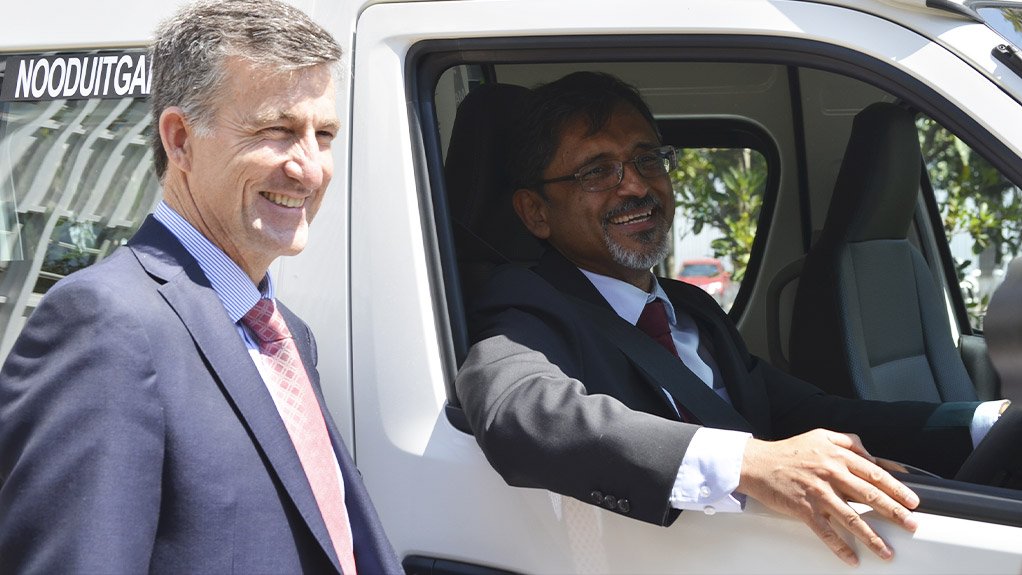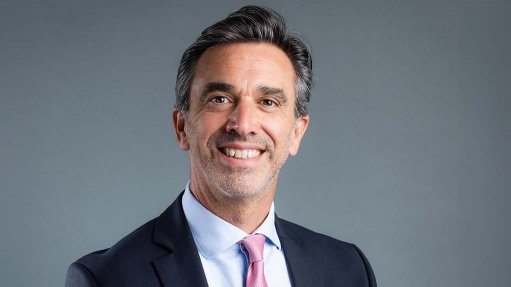Industry, former Ministers weigh in on NEV production viability as govt mulls policy


Toyota South Africa Motors CEO Andrew Kirby and Trade, Industry and Competition Minister Ebrahim Patel
Speaking during the inaugural South African Auto Week conference in Kyalami, Midrand, this week, Trade, Industry and Competition Minister Ebrahim Patel said there could never be a single, binary switch to electric vehicles (EVs) in South Africa.
He explained that there was a continuing market for internal combustion engine (ICE) vehicles and a growing market for EVs, which necessitated a commercially sustainable case to be built for original-equipment manufacturers (OEMs) to cater for both markets.
Patel added that there were other technologies that were also impacting on vehicle manufacturing decisions and new energy vehicle (NEV) strategies, which required that manufacturers and government were agile enough to adapt to these changes and reskill employees accordingly.
“For government to be able to navigate the terrain of positioning people to benefit from technological innovation, instead of them being the collateral damage, many environments have to be managed – markets, the European Union decisions and social stability,” Patel stated, adding that this was why it had taken government some time to finalise the Advancement of NEVs White Paper.
The Green Paper on the matter was released in May last year, in efforts to establish a policy foundation for NEVs and the way forward for South Africa’s automotive manufacturing.
In the meantime, Patel affirmed that government was engaging with multinational and local corporates to ensure greater investment in businesses, including to establish their EV headquarters and manufacturing capacity in the country.
However, the Minister pointed out that the single biggest challenge to this industrialisation remained infrastructure – energy, rail, roads and ports in particular. To this end, he said government had already put measures in place for energy supply to become decentralised.
There was also the issue of service stations for EVs and who would be responsible for building and maintaining them, Patel said, especially considering that passenger EV sales would likely exceed that of ICE vehicles before 2038.
Patel said this required the structural transformation of the automotive industry to align to EVs.
Government has, in its considerations for an NEV strategy, been weighing up costs, local content requirements and the viability of local battery production, as well as whether the electricity grid could handle charging infrastructure.
Patel said the country had to be sufficiently cautious in recognising that the grid was stretched, and that government was not keen on a drastic energy demand increase within the next two years. “First, we have to increase energy generation.”
The Minister stressed the importance of announcing an NEV policy that was well balanced and sustainable, with businesses needing to be able to rely on government’s commitments.
Meanwhile, former Trade and Industry Ministers Alec Erwin and Dr Rob Davies stressed the importance of evidence-based decision-making when it comes to policy.
Erwin added that effective industrial policy needed solid and understanding leadership, dialogues about complexities and long-term stances but with mechanisms to adjust to new circumstances.
He said there would always be unintended consequences with policy decisions, but it had to be adjusted to in the best manner.
Davies stated that, the automotive sector’s most productive decisions and support, were those that were led by researched inputs. He also emphasised the importance of allowing new entrants into the market, especially since there was a massive Tier 2 and Tier 3 supplier shortage.
Erwin agreed, adding that more support for component suppliers to enter into the market was needed, as was an alteration to the “antiquated bargaining structure”. He said wage negotiations had to be reshaped for the industry, especially given the changing global context, since collective bargaining was instituted.
Davies warned that the industry would need to look out for protectionism measures coming about, “dressed up” as climate change activism.
Erwin echoed this sentiment, saying the current government should not be naïve. “Europe is waking up to the fact that they have a major structural problem on their hands. While they know they have to change their industrialisation and ‘go green’, they have hit a structural problem with energy.
“If they cannot make their own adjustments for the transition, they will try and force supplying countries to adjust on their behalf. European countries are looking out for their own interests, and South Africa cannot afford to bear all the cost of their adjustment, if they cannot get out of their predicament by themselves. Both countries ought to benefit from automotive trade.”
INDUSTRY RESPONSE
Western Cape Minister of Mobility Daylin Mitchell said the provincial government could not wait for national government’s stance on NEV policy to be finalised and, therefore, took proactive steps to adopt its own strategy.
The province has already identified potential NEV production sites in the province and was engaging industry stakeholders to realise projects, while having NEVs as part of the provincial government’s fleet already.
Imperial Logistics’ Africa division CEO Edwin Hewitt said the logistics industry would not easily switch to any one NEV technology without considering cost implications for its customers and the issue of refuelling at remote destinations, especially on the African continent.
UD Trucks Southern Africa MD Filip van den Heede agreed, explaining that with passenger cars, OEMs can assume consumers will have charging points at home, but to make NEV trucks viable, companies themselves have to have infrastructure for refuelling or recharging in place.
“To successfully electrify or gasify, the industry needs to follow a model of access to power to the last mile.”
BMW Group South Africa CEO Peter van Binsbergen said that, for a “switch” to NEVs to occur in the automotive manufacturing industry, the country needed economies of scale, therefore maximised production of cars, and a focus on what components can be produced locally.
“In this regard, South Africa has to be an attractive destination for localisation investment, and be a reliable partner in the global network, with on-time shipments and top quality produced,” he highlighted, adding that there would be no significant investment into NEV production if Transnet cannot promise on-time shipments.
Toyota South Africa Motors CEO Andrew Kirby said OEMs would put 50% of its production at risk if they did not produce low- or zero-emission vehicles as soon as 2030, owing to pressure from export markets, European countries announcing restrictions on ICE vehicles and the local regulatory drive that is happening.
He believed that, to see real change in the manufacturing space, there needed to be change in how the industry was supported.
Kirby said specific NEV technologies would need incentives and that battery production was a “special project” that needed unique ways of collaboration, as it was perhaps a whole separate industry.
Comments
Announcements
What's On
Subscribe to improve your user experience...
Option 1 (equivalent of R125 a month):
Receive a weekly copy of Creamer Media's Engineering News & Mining Weekly magazine
(print copy for those in South Africa and e-magazine for those outside of South Africa)
Receive daily email newsletters
Access to full search results
Access archive of magazine back copies
Access to Projects in Progress
Access to ONE Research Report of your choice in PDF format
Option 2 (equivalent of R375 a month):
All benefits from Option 1
PLUS
Access to Creamer Media's Research Channel Africa for ALL Research Reports, in PDF format, on various industrial and mining sectors
including Electricity; Water; Energy Transition; Hydrogen; Roads, Rail and Ports; Coal; Gold; Platinum; Battery Metals; etc.
Already a subscriber?
Forgotten your password?
Receive weekly copy of Creamer Media's Engineering News & Mining Weekly magazine (print copy for those in South Africa and e-magazine for those outside of South Africa)
➕
Recieve daily email newsletters
➕
Access to full search results
➕
Access archive of magazine back copies
➕
Access to Projects in Progress
➕
Access to ONE Research Report of your choice in PDF format
RESEARCH CHANNEL AFRICA
R4500 (equivalent of R375 a month)
SUBSCRIBEAll benefits from Option 1
➕
Access to Creamer Media's Research Channel Africa for ALL Research Reports on various industrial and mining sectors, in PDF format, including on:
Electricity
➕
Water
➕
Energy Transition
➕
Hydrogen
➕
Roads, Rail and Ports
➕
Coal
➕
Gold
➕
Platinum
➕
Battery Metals
➕
etc.
Receive all benefits from Option 1 or Option 2 delivered to numerous people at your company
➕
Multiple User names and Passwords for simultaneous log-ins
➕
Intranet integration access to all in your organisation



















